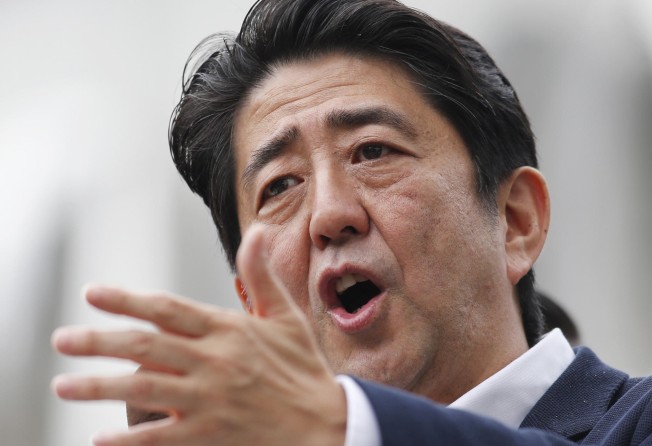Japan PM Abe looks to put economy back on track with Deng-style SEZs
Prime minister's call for special economic zones as part of his 'Abenomics' reforms are seen as a throwback to Deng Xiaoping's experiments

Guess what a successful Japanese economy would look like? Probably a lot like China's.
Anti-China rhetoric helped Shinzo Abe gain power, yet the prime minister's only chance of putting the Japanese economy back on the rails depends on how well he manages to learn an art that China mastered long ago - special economic zones (SEZs).
And to do that, he might have to borrow a page from the playbook of Premier Li Keqiang, who recently managed to push through his Shanghai free-trade zone plan after fighting off internal opposition.
Abe's desperation to succeed is palpable. His Liberal Democratic Party will be tested on Sunday when half of the upper house's 242 seats come up for election. Securing a majority there will be key to pushing ahead with economic measures and a planned increase in consumption tax that holds the key to balancing the budget.
"We have been miserable in the past 20 years," said LDP leader Yasutoshi Nishimura, senior vice-president of cabinet responsible for economic and fiscal policy, at a conference with Hong Kong investors last week, underlining the government's determination to succeed. "This is the last chance for Japan's economy and this is the last chance for our party," said the man known to be playing a major part in "Abenomics", the prime minister's three-part plan to turn around the economy.
The Abe administration has already launched aggressive monetary and flexible fiscal policies, the first two "arrows" of his plan, to great effect, as rising stock prices and improving economy data seem to suggest. The real test will be the third arrow the government announced last month.
This step comprises SEZs, along with sweeping structural reforms in the private sector, better health care for the nation's ageing population and increasing the number of women in the workforce.
SEZs form the core of this growth strategy, but Abe is likely to run into opposition when setting them up. The SEZs, which will be called "national strategic special zones", are aimed at strengthening Japan's competitiveness as a business hub, said Nishimura. The goals are to make Japan the third easiest Organisation for Economic Co-operation and Development country to do business in by 2020, up from 15th at present, and to double foreign direct investment into Japan to 35 trillion yen (HK$2.7 trillion) by the same time.
Details are sketchy on the SEZs at this stage, other than that Tokyo, Osaka and Nagoya could be chosen as bases. Experts believe SEZs, which have resulted in boomtowns like Shenzhen, Xiamen and Zhuhai in China, will be a hard sell in Japan.
Japan has in the past tried SEZs, which allow political and economic experiments not permitted elsewhere in the country, but they did not go anywhere, according to HSBC economist Izumi Devalier. "There was a lack of co-ordination between the central government and the localities," Devalier said, adding Abe would need to co-opt bureaucrats, who wield enormous power.
"A special economic zone has to stand out in contrast with other parts of a country that are not special," said Professor Lok-sang Ho, professor of economics and director of the Centre for Public Policy Studies at Lingnan University. Unlike China, which initiated its first SEZ three decades ago when the economy was closed, it was more difficult for Japan to offer something really "special" at this stage of its development, as the economy was already market-oriented, Ho said.
Tax breaks, which he said were the backbone of SEZs, would have to differ significantly from the rest of the country for these zones to matter.
Nishimura stressed to Hong Kong businesspeople how crucial SEZs were for Japan's international trade through the Trans-Pacific Partnership (TPP), the free-trade agreement under negotiation among Asia-Pacific economies including the US, and the Regional Comprehensive Economic Partnership, a 16-party free-trade agreement between the Association of Southeast Asia Nations and their FTA partners.
While Abenomics advocates like Nishimura look to the TPP and RCEP as an opportunity, it might create more difficulties for the government. Vested interests in the agricultural sector will resist first. Rural constituents, long against opening up, are over-represented in the Diet, said Professor Brian Bridges, a political scientist at Lingnan University.
Professor Jean-Pierre Cabestan, head of the department of government and international studies at Baptist University, said Abe would have to fight institutional resistance of the "iron triangle" of elected officials, unelected bureaucrats and big business.
The LDP's rural base would make it hard for Abe to reconcile the conflicting interests of farmers with the Japanese economy as a whole, said Bridges.
"[Former prime minister] Junichiro Koizumi tried to change things in 2002 and ran into vested interests," he said, adding that a decade of stagnation could have made SEZs and TPP more acceptable.
"Abenomics will be a rough ride politically and economically, but coming from a family of politicians and well connected to bureaucrats, Abe has the potential to not only lead the party but also redefine the LDP," said Cabestan.